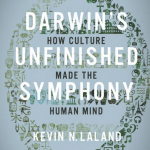brain evolution
Darwin's Unfinished Symphony: How Culture Made the Human Mind is a new book on cultural evolution in humans from a biological perspective.
This is an interesting book and a good book, and I recommend it, but I need to add a strong caveat. The author could have made a more compelling argument had he more carefully studied and used some of the prior work that makes a similar argument. He strangely cites Terry Deacon in two places (once as a psychologist, incorrectly) for work Deacon has done, but seems to ignore Deacon's key thesis, which is pretty much the same as Laland's key thesis. (See:…
Skull of Hadrocodium wui. (Image courtesy of Mark Klinger and Zhe-Xi Luo, Carnegie Museum of Natural History)
THE question of how mammals evolved their exceptionally large brains has intrigued researchers for years, and although many ideas have been put forward, none has provided a clear answer. Now a team of palaeontologists suggests that the mammalian brain evolved in three distinct stages, the first of which was driven by an improvement in the sense of smell. Their evidence, published in tomorrow's issue of Science, comes from two fossilized skulls, each measuring little more than 1cm in…
Sponges are among the most primitive of all animals. They are immobile, and live by filtering detritus from the water. They have no brains or, for that matter, any neurons, organs or even tissues. If you were looking for the evolutionary origins of animal intelligence, you couldn't really pick a less likely subject to study.
So it was with great surprise that Onur Sakarya from the University of California, Santa Barbara found that sponges carry the beginnings of a nervous system.
With no neurons to speak of, these animals still have the genetic components of synapses, one of the most…
